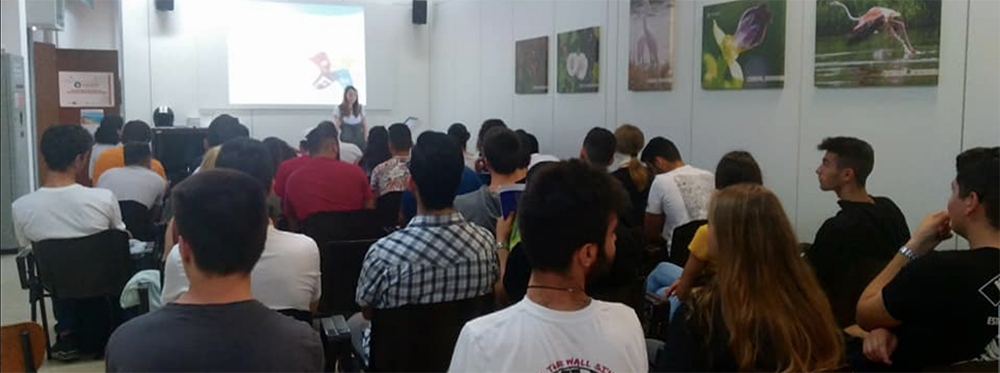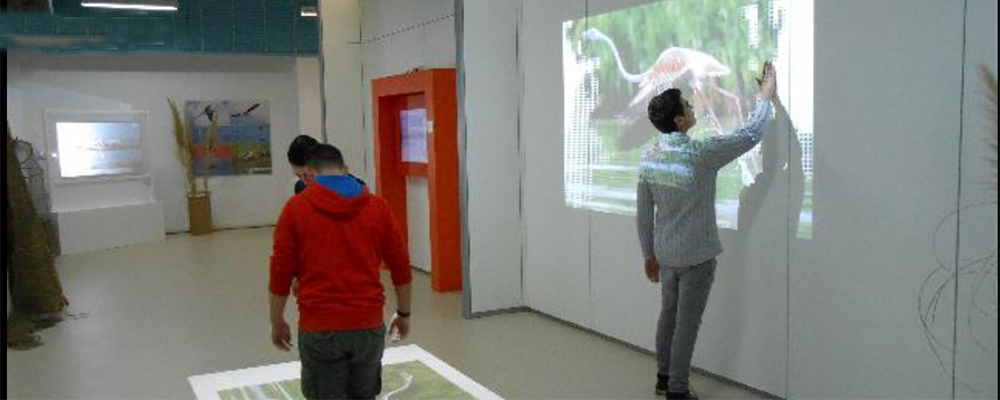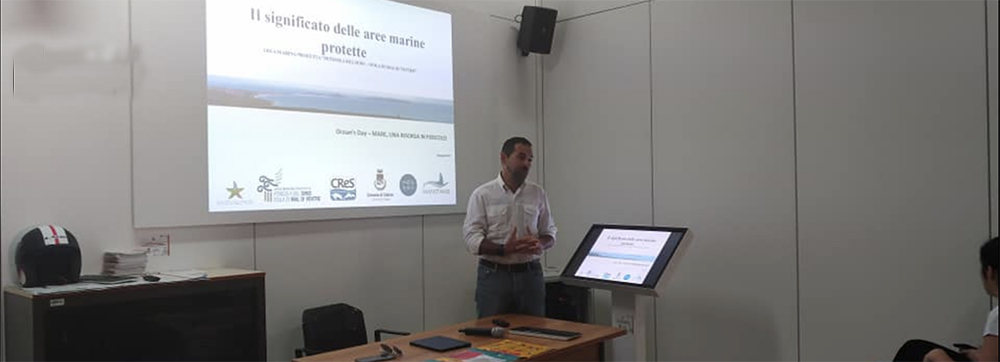The Maristanis Project celebrated the Oceans Day 2019 together with the Othoca Industrial Technical Institute of Oristano. On Saturday the 8th of June the "Multimedia Wetlands Laboratory" hosted dozens of students, gathered to hear the speeches of the experts of the MEDSEA Foundation and of the Marine Protected Area of Sinis-Isola di Mal di Ventre. The laboratory, created in 2015 by the Environment sector of the Province of Oristano as part of the "ZOUMATE" cross-border project, is a window on the six Ramsar sites embracing the gulf. Shop windows, portals, interactive plans and touch screens guide students and visitors on a journey through the fragile morphological, animal and plant wonders of the wetlands. A true avant-garde educational theater, where the convention stipulated by the Othoca and Maristanis will soon be implemented: MEDSEA researchers will provide training courses on wetland ecosystems to teachers included in the eleven municipalities of the project. Meetings will also be open to a large number of elementary, middle and high school students.
“For us it is essential that the population of the territories involved take part actively in the project. One of our strategies focuses on increasing the degree of community awareness regarding the environmental, economic and cultural value of the Ramsar sites. We have high hopes for teachers and students ", stated in the opening address Vania Statzu, vice president of MEDSEA. Vanessa Melas, the foundation's environmental economist, introduced the boys to the principles of the circular economy: "While the planet's resources are limited, society is tangled in development models that are increasingly oriented towards waste. For this reason, the political institutions have at various levels begun to respond structurally to the problem of waste management. European and national laws and directives are now fundamental for the protection of man and the environment in which he lives. Not only we must strive to reduce waste, it is necessary to recycle and reuse it as much as possible, abandoning the linear economic model in favor of the circular one. The plastic we use only once tortures birds forever".
Not only the birds, which hungry pause on the floating plastic islands, mistaking them for landing points, but also the inhabitants of the sea. Plastic severely damaged the front fin of "Monky" and the intestine of "Sausage", tortoises hosted by the CRES, the Sinis Recovery Center for Cetaceans and Sea Turtles. “The Mistral brings large quantities of macro and microplastics to the Sardinian coasts. We monitored Sardinian waters, we went as far as the Ligurian Sea and the Balearics. We did not find a single site immune to the problem of plastics", said Andrea de Lucia of the IAS, the Institute for the Study of Anthropic Impacts and Sustainability in the Marine Environment of the CNR-National Research Center. His colleague Luca Palazzo moves amid the tanks where ten specimens of sea turtles are monitored. One hundred turtles each year (alive or dead) get treated in the CRES rooms, part of the Regional Network for the Conservation of Marine Fauna in Sardinia.
"Today we know that microplastics are also present in table salt, and that phthalates (plasticizing agents like those capable of softening the films used for food) are carcer-causing. Unfortunately, many scientific discoveries reveal their negative impact on environment and health only many years after the initial enthusiasm”, adds in her speech Maria Pala, MEDSEA’s environmental scientist. The reaction of teachers and students is palpable when on the screen are displayed images showing the consequences of the indiscriminate use of disposable plastic: a sperm whales killed by waste or the explanation of how biomagnification (the process of accumulation of toxic substance in living beings) leads to the maximum concentration of poisons in predators at the top of the food chain, tuna and swordfish at sea, humans in the transition to land.
In recent years it has become one of the symbols of the aggression brought by men to the Earth the "Great Pacific Garbage Patch", a sector of the Pacific Ocean where the currents amass waste to make up a floating island as wide as the Iberian peninsula. But, the students were advised by
Ante Ivcevic, PhD student in Earth Sciences at the University of Marseille and collaborator of MEDSEA, the same phenomenon occurs in the Mediterranean, where the Scirocco wind in the winter season accumulates tons of waste on the Adriatic coast, transforming the beaches, sometimes appendages of important national parks, in desolate dumps. "Not just plastic. The meteotsunami also arrive on our shores, waves created by pressure leaps that can get six meters high and are sometimes devastating for the coastal populations", explains Ivcevic, who then goes on to include the cold month of May experienced in Europe in the wider phenomenon climate change.
Giorgio Massaro, marine biologist of the MEDSEA team, accompanied the students in the world of sea monitoring techniques and technologies. Probes, drones, ROVs (remote-guided vehicles) are all necessary to identify endangered areas: “Bottom trawling destroys expanses of coral grown over the centuries, devastates habitats and fish fauna, is able to lift debris that once on the surface can be even seen from space". Among those who became famous as sea-defenders heroes, Massaro chooses the women, like the American conservationist Julie Packard, the photographer Anne de Carbuccia, the Italian Mariasole Bianco and Francesca Santoro, respectively biologist and expert in sustainable development. All heirs of the pioneer Rachel Carson: "The more we can focus our attention on the wonders and realities of the universe around us, the less we should find pleasure in destroying it" wrote the American marine biologist.
From history back to contemporaneity with Massimo Marras, director of the Marine Protected Area of Sinis-Isola di Mal di Ventre: "We must constantly monitor and study to face the dangers threatening our ecosystem, like the aggressive methods of fishing that lead to species extinction. But above all, as a community, we must understand that its protection begins every day in the individual gesture, at the supermarket when we avoid buying disposable plastic products, which the sea will never be able to eliminate".

The Island made of mussels in Corru Mannu's pond began to be populated by birds
Little tern, common tern, sandwich tern, rosy gull and black-winged stilt are some of the bird species that have found a home in Corru Mannu in recent weeks. Thanks to…

Sardinian Wetlands, the best way to protect them is "to manage them"
Cagliari, 04.02.2023 – Le zone umide sono ecosistemi acquatici sempre più rilevanti, conoscerli meglio è il primo passo per tutelarli, ma non è tutto. “Serve uno strumento di gestione” per…

The II D from Terralba Institute visited the Old Tower of Marceddì as prize for Terre d'Acqua school contest 2022
Learning about the role of these precious and very important ecosystems, as well as the specificities of the large wetland area of Oristano. In recent days we have accompanied the…

Maristanis was showcased at the Ramsar COP 14 on wetlands during a side event
The 14th meeting of the Ramsar Wetlands Conference (COP14) was held in Geneva from 5 to 13 November 2022, simultaneously also in Wuhan, China. At the International Conference Center in Geneva (CICG) all…

Learning from the Maristanis's model in the ENSERES's visit exchange
Two days to study an integrated management model of marine-coastal systems, two days to strengthen ties and develop new strategies for a sustainable future of the Mediterranean. The Italian stage…

A step forward for the Maristanis project, towards the Regional Park of wetlands in Sardinia
The Municipal Council of Oristano, on the proposal of the Councilor for the Environment Maria Bonaria Zedda, has launched the participatory process and the preparatory actions necessary for the establishment…

Evaluating ecosystem services by the TESSA Methodology in Arborea
How to understand the effects on natural capitals and actual and potential state changes of individual sites important in promoting decisions to support both biodiversity conservation and ecosystem service provision?

Terre D'Acqua 2022, the winners of the school contest within the Maristanis Project
With 87 works, of which 84 in the drawing category and 3 in the comics category, the MEDSEA Foundation's Terre D’Acqua 2022 Competition ends. The school contest took place from February…

The Sardinian farms met in Arborea under the sign of Sustainability
This is the year of relaunch for the La Fiera dell’agricoltura di Arborea (Agricultural Fair of Arborea), one of the most important thematic fairs in Sardinia that promotes the productive, agro and…

Maristanis in the news: Rai and Italia 1 dedicated ample space to the Maristanis Project
The Italian press gave ample space to the Maristanis project in recent months, the Oristanese wetlands and its most important project Maristanis were told in various national and local television reports on…

The winner of the World Wetlands Day in Sardinia 2022 Contest
With a picture taken in the Oristanese lagoons representing a group of flamingos and the sentence "They come / They come back / Sometimes they stop / Like nomads /…

Over 700 visitors for the World Wetlands Day Calendar
Over 700 visitors in the World Wetlands Day collective calendar, put together by the MEDSEA Foundation, as part of the Maristanis project last February, with the aim of promoting the precious…

The World Wetlands Day 2022 in Sardinia lasts a month, the events Calendar
As every year, the World Wetlands Day on the anniversary of the RAMSAR convention (of 1971, Feb. 2nd) calls and Sardinia, in particular the Oristanese area, replies within the Maristanis project that…

World Wetlands Day in Sardinia, from 2 to 27 February join the competition #WWDSardegna on Instagram
In the occasion of the World Wetlands Day which celebrates ponds and lagoons in the world next February 2, the MEDSEA foundation launches the contest on wetlands in Sardinia with the hashtag #WWDSardegna to…

MAVA Steering Committee in Provence: Sardinia was promoted with the Maristanis project
MEDSEA foundation, which has been carrying out the Maristanis project in the Oristano area in Sardinia since 2017, attended last week the yearly meeting of the MAVA steering committee. The session took place from 16 to 17 December 2021 in Châteauneuf-le-Rouge, in the Provence-Alpes-Côte d'Azur region, and gathered together the…

Terre d'Acqua, a wetlands school competition for students in the Oristanese
On February 2, the World Wetlands Day will be celebrated once again the Oristanese wetlands region. To recall the central role of wetlands in addressing climate and environmental crisis and to raise awareness of the importance of these basins especially in this west coast side…
- 1
- 2
- 3
- 4



